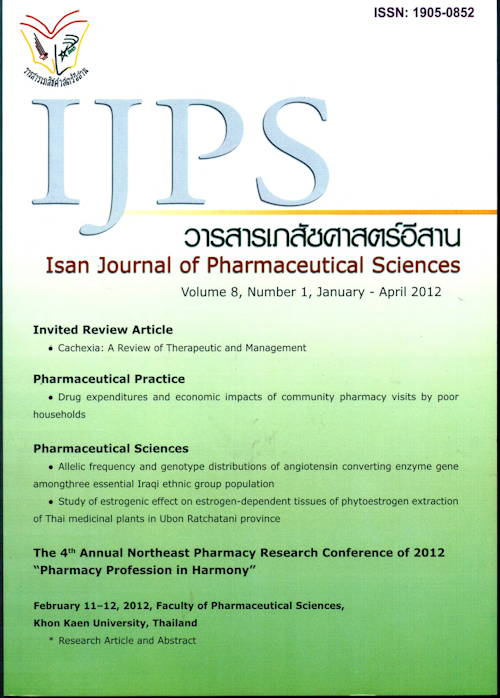Gender differences in the metabolic syndrome screening using modified Thai Diabetes Risk Score
Main Article Content
Abstract
Introduction: Diabetes risk score is a questionnaire which can be used for metabolic syndrome screening in clinical practice. This study aimed to test metabolic syndrome screening with the modified Thai Diabetes Risk Score in male and female. Materials and methods: This study was designed as a cross sectional analytical and analysed from computer database of special medical examination room, Srinagarind hospital, Khon Kaen between January 2007 and December 2009, aged 35-75 years. The data collection was performed only the first result and completed data of individuals attending checkup clinic included age, gender, waist circumference, body mass index, blood pressure, fasting blood glucose, triglyceride, and high density lipoprotein. The exclusion was done on incomplete data or previously diagnosed with dyslipidemia. The randomization of sample used statistical software SPSS for Windows version 16.0. The test of metabolic syndrome screening with the modified Thai Diabetes Risk Score was analyzed by receiver operating characteristic (ROC) of the modified Thai Diabetes Risk Score in male and female. The optimal cutoff point for metabolic syndrome screening in male and female was analyzed by statistical software STATA version 12.0. Results: The area under the ROC of the modified Thai Diabetes Risk Score in male and female were not different. Hence, the optimal cutoff point for metabolic syndrome screening in male and female were the same point (cutoff = 6 based on the score ranged from 0 to 13) with sensitivity 83.8 (95% Cl 79.2-87.6), specificity of 73.1(95% Cl 70.3-75.8), false positive rate of 26.9 (95% Cl 24.2-29.7), false negative rate of 116.2 (95%CI 12.4-20.8), PPV of 47.7 (95% Cl 43.4-52.0), NPV of 93.3 (95% Cl 92.0-95.4). 39.8% of patients need subsequent test to confirm diagnosis.
Article Details
In the case that some parts are used by others The author must Confirm that obtaining permission to use some of the original authors. And must attach evidence That the permission has been included
References
Aekplakorn, et al. A risk score for predicting incident diabetes in the Thai population. Diabetes Care 2006 Aug; 29(8): 1872-7.
Alberti KG, et al. Harmonizing the metabolic syndrome: a joint interim statement of the International Diabetes Federation Task Force on Epidemiology and Prevention; National Heart, Lung, and Blood Institute; American Heart Association; World Heart Federation; International Atherosclerosis Society; and International Association for the study of Obesity. Circulation 2009 Oct 20; 120(16); 1640-5.
Alberti KG, Zimmet PZ. Definition, diagnosis and classification of diabetes mellitus and its complications. Part 1: diagnosis and classification of diabetes mellitus provisional report of a WHO consultation. Diabet Med 1998 Jul; 15(7): 539-53.
Balkau B, Charles MA. Comment on the provisional report from the WHO consultation. European Group for the study of Insulin Resistance (EGIR). Diabet Med 1999 May; 16(5); 442-3.
Grundy SM, Brewer HB, Jr., Cleeman JI, Smith sc, Jr., Lenfant c. Definition of metabolic syndrome: Report of the National Heart, Lung, and Blood Institute/American Heart Association conference on scientific issues related to definition. Circulation
Jan 27; 109(3): 433-8.
UN JW, et al. Cross-sectional validation of diabetes risk scores for predicting diabetes, metabolic syndrome, and chronic kidney disease in Taiwanese. Diabetes Care 2009 Dec; 32(12): 2294-6.
Pomtrakulphiphat S, Thepsuthammarat K, Treapkhuntong T, Pratipanawatr T. Modified Thai Diabetes Risk Score as a Screening Tool for Identification Metabolic syndrome. Srinagarind Medical Journal 2011; 26(3): 213-24.
Saaristo T, et al. Cross-sectional evaluation of the Finnish Diabetes Risk Score: a tool to identify undetected type 2 diabetes, abnormal glucose tolerance and metabolic syndrome. Diab Vase Dis Res 2005 May; 2(2); 67-72.
Tsai TY, Cheng JF, Lai YM. Prevalence of metabolic syndrome and related factors in Taiwanese high-tech industry workers. Clinics (Sao Paulo) 2011; 66(9); 1531-5.
Wannamethee SG, Shaper AG, Lennon L, Morris RW. Metabolic syndrome vs Framingham Risk Score for prediction of coronary heart disease, stroke, and type 2 diabetes mellitus. Arch Intern Med 2005 Dec 12-26; 165(22); 2644-50.


